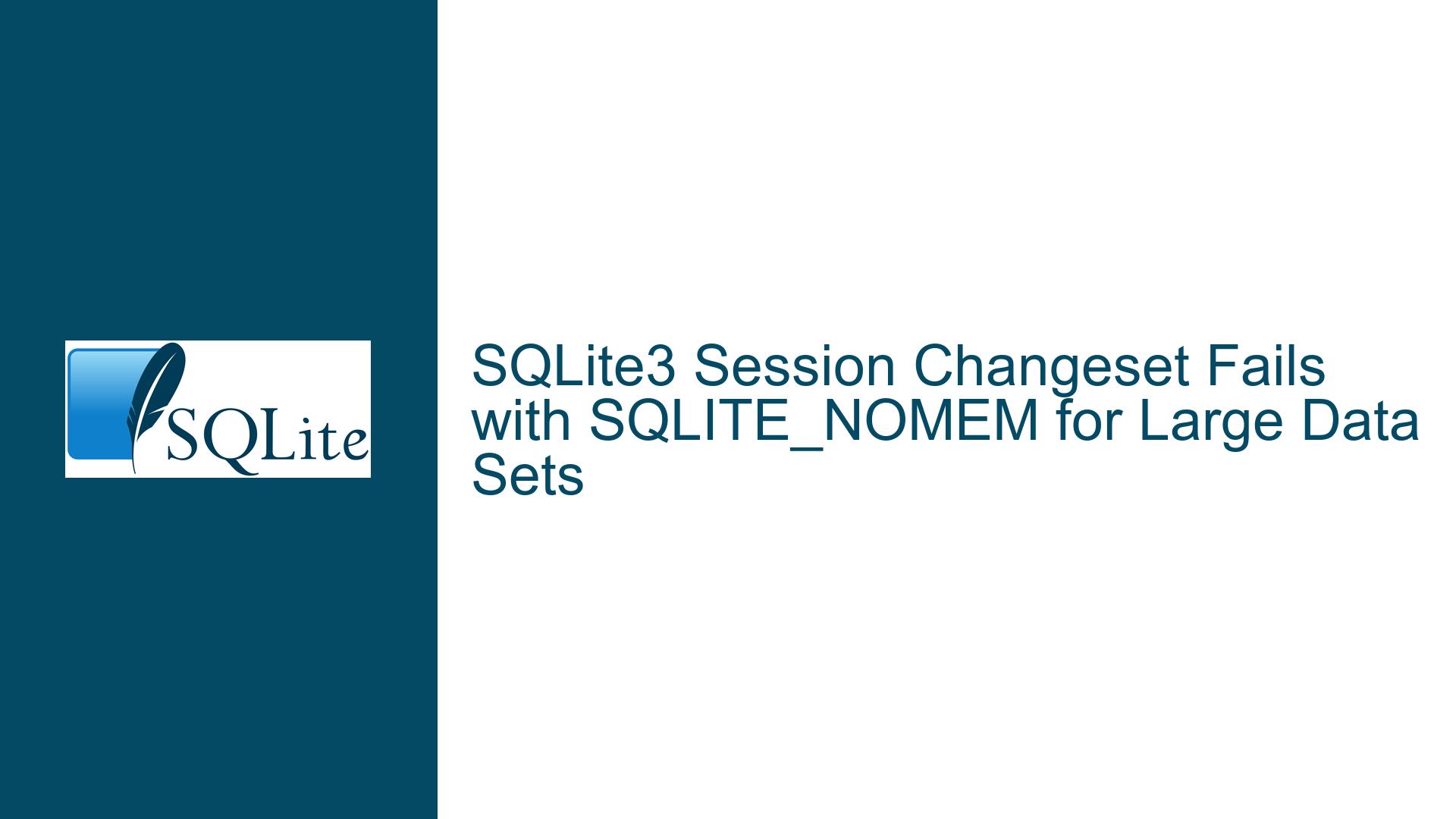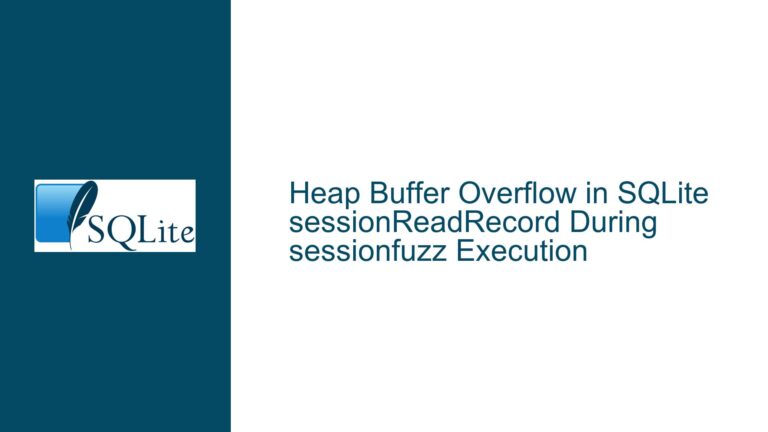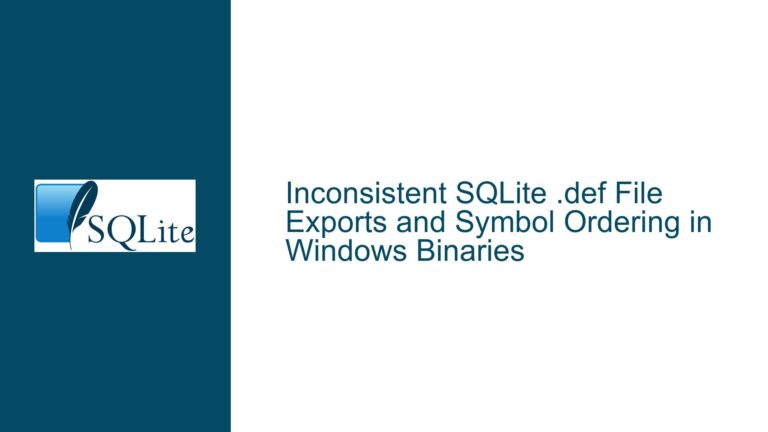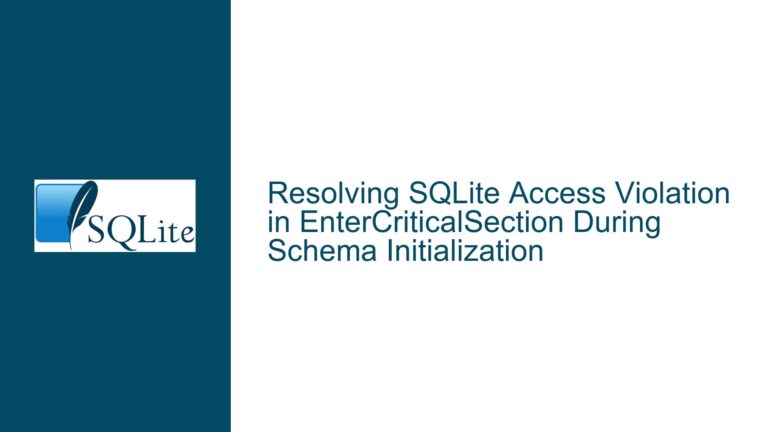SQLite3 Session Changeset Fails with SQLITE_NOMEM for Large Data Sets
Understanding the SQLITE_NOMEM Error in sqlite3session_changeset for Large Data Sets
The SQLITE_NOMEM error in SQLite is a common yet critical issue that arises when the database engine is unable to allocate the required memory for an operation. In the context of the sqlite3session_changeset function, this error occurs when attempting to generate a changeset from a session that tracks a large volume of data, typically exceeding 1.0 GB. The changeset generation process involves creating a binary representation of the changes made to the database tables, which is then used for synchronization or replication purposes. When the session tracks a substantial amount of data, the memory allocation required for the changeset can surpass the internal limits set by SQLite, leading to the SQLITE_NOMEM error.
The sqlite3session_changeset function is part of SQLite’s session extension, which provides a mechanism for tracking changes to database tables. This function is crucial for applications that require incremental updates or synchronization between databases. However, when dealing with large datasets, the function’s internal memory management can become a bottleneck. The error is particularly problematic because it occurs without any explicit documentation or warning in the SQLite documentation, leaving developers to troubleshoot and resolve the issue independently.
The root cause of the SQLITE_NOMEM error in this context lies in the sessionBufferGrow function, which is responsible for dynamically resizing the buffer used to store the changeset. The function attempts to double the buffer size each time it needs to grow, but this approach can lead to memory allocation requests that exceed SQLite’s internal limits. Specifically, when the buffer size reaches or exceeds 1.0 GB, the subsequent doubling of the buffer size can result in a request for more memory than SQLite’s memory allocator can handle, triggering the SQLITE_NOMEM error.
Investigating the Memory Allocation Limit in sessionBufferGrow
The sessionBufferGrow function is a critical component of the sqlite3session_changeset operation, responsible for managing the memory allocation for the changeset buffer. The function starts with an initial buffer size and doubles it each time more space is needed. This exponential growth strategy is efficient for small to medium-sized datasets but becomes problematic when dealing with large datasets. The issue arises because the function does not account for the upper limits of memory allocation imposed by SQLite’s internal memory management system.
In SQLite, the sqlite3_realloc64 function is used to resize memory blocks. This function, in turn, calls sqlite3Realloc, which has a built-in limit to prevent integer overflow and other memory-related issues. The limit is set at 0x7fffff00 bytes, which is approximately 2.0 GB minus 256 bytes. When the sessionBufferGrow function attempts to double the buffer size beyond this limit, the sqlite3Realloc function returns a null pointer, indicating that the memory allocation request has failed. This failure is then propagated back to the sqlite3session_changeset function, resulting in the SQLITE_NOMEM error.
The problem is exacerbated by the fact that the sessionBufferGrow function does not check whether the new buffer size will exceed SQLite’s memory allocation limit before attempting to resize the buffer. As a result, the function can request a buffer size that is well beyond the maximum allowable size, leading to an inevitable memory allocation failure. This behavior is particularly problematic for applications that need to generate changesets for large datasets, as it effectively limits the size of the changeset that can be generated.
Resolving the SQLITE_NOMEM Error with a Patched sessionBufferGrow Function
To address the SQLITE_NOMEM error in sqlite3session_changeset, a patch has been proposed that modifies the sessionBufferGrow function to respect SQLite’s memory allocation limits. The patch introduces a check to ensure that the buffer size does not exceed the maximum allowable size before attempting to resize the buffer. Specifically, the patch limits the buffer size to 0x7FFFFEFE bytes, which is 2 bytes below the maximum threshold defined in sqlite3Malloc. This ensures that the buffer size remains within the limits of SQLite’s memory allocator, preventing the SQLITE_NOMEM error from occurring.
The patched sessionBufferGrow function works by first checking whether the current buffer size is sufficient to accommodate the requested number of bytes. If not, the function enters a loop where it doubles the buffer size, but only up to the maximum allowable size. If the buffer size reaches the maximum allowable size and is still insufficient to accommodate the requested number of bytes, the function sets the return code to SQLITE_NOMEM and exits the loop. This ensures that the function does not attempt to allocate more memory than SQLite can handle, preventing the SQLITE_NOMEM error from occurring.
The patch also includes a check to ensure that the buffer size does not exceed the maximum allowable size when calling sqlite3_realloc64. If the buffer size exceeds the maximum allowable size, the function sets the return code to SQLITE_NOMEM and does not attempt to resize the buffer. This ensures that the function fails gracefully when the requested buffer size is too large, rather than attempting to allocate an excessive amount of memory and triggering a memory allocation failure.
The proposed patch has been tested and verified to resolve the SQLITE_NOMEM error in sqlite3session_changeset for large datasets. By limiting the buffer size to the maximum allowable size, the patch ensures that the function can generate changesets for datasets of up to 1.0 GB without encountering memory allocation issues. This allows applications to continue using the sqlite3session_changeset function for large datasets without the risk of encountering the SQLITE_NOMEM error.
Implementing the Patch and Verifying the Fix
To implement the patch, developers need to modify the sessionBufferGrow function in their SQLite source code. The modified function should include the checks and limits described above to ensure that the buffer size does not exceed the maximum allowable size. Once the patch has been applied, developers should recompile SQLite and test the sqlite3session_changeset function with large datasets to verify that the SQLITE_NOMEM error no longer occurs.
The patch has been integrated into the SQLite source code and is available in the latest versions of SQLite. Developers who are experiencing the SQLITE_NOMEM error in sqlite3session_changeset should update to the latest version of SQLite to benefit from the fix. The fix has been tested and verified to work with datasets of up to 1.0 GB, ensuring that the sqlite3session_changeset function can generate changesets for large datasets without encountering memory allocation issues.
In addition to applying the patch, developers should also consider optimizing their database schema and queries to reduce the amount of data that needs to be tracked by the session extension. By minimizing the amount of data that needs to be included in the changeset, developers can reduce the memory requirements of the sqlite3session_changeset function and further mitigate the risk of encountering the SQLITE_NOMEM error.
Best Practices for Handling Large Datasets in SQLite Sessions
When working with large datasets in SQLite sessions, it is important to follow best practices to avoid memory allocation issues and ensure optimal performance. One key best practice is to limit the amount of data that is tracked by the session extension. This can be achieved by selectively enabling session tracking for specific tables or columns, rather than tracking all changes to the database. By reducing the amount of data that needs to be included in the changeset, developers can minimize the memory requirements of the sqlite3session_changeset function and reduce the risk of encountering the SQLITE_NOMEM error.
Another best practice is to use incremental changeset generation, where changesets are generated and applied in smaller, more manageable chunks. This approach allows developers to process large datasets in stages, rather than attempting to generate a single large changeset. By breaking the changeset generation process into smaller steps, developers can reduce the memory requirements of the sqlite3session_changeset function and avoid memory allocation issues.
Developers should also consider using external tools or libraries to handle large datasets, rather than relying solely on SQLite’s built-in functions. For example, developers can use a custom memory allocator or a specialized data processing library to handle large datasets more efficiently. By offloading some of the data processing tasks to external tools, developers can reduce the memory requirements of the sqlite3session_changeset function and improve overall performance.
Finally, developers should regularly monitor and optimize their database schema and queries to ensure that they are using SQLite’s resources efficiently. This includes indexing tables, optimizing queries, and minimizing the amount of data that needs to be processed by the session extension. By following these best practices, developers can reduce the risk of encountering the SQLITE_NOMEM error and ensure that their applications can handle large datasets effectively.
Conclusion
The SQLITE_NOMEM error in sqlite3session_changeset is a significant issue for developers working with large datasets in SQLite. The error occurs when the function attempts to allocate more memory than SQLite’s internal memory allocator can handle, resulting in a memory allocation failure. The root cause of the error lies in the sessionBufferGrow function, which does not account for SQLite’s memory allocation limits when resizing the changeset buffer.
To resolve the issue, a patch has been proposed that modifies the sessionBufferGrow function to respect SQLite’s memory allocation limits. The patch ensures that the buffer size does not exceed the maximum allowable size, preventing the SQLITE_NOMEM error from occurring. The patch has been integrated into the latest versions of SQLite and has been tested and verified to work with datasets of up to 1.0 GB.
In addition to applying the patch, developers should follow best practices for handling large datasets in SQLite sessions, including limiting the amount of data tracked by the session extension, using incremental changeset generation, and optimizing their database schema and queries. By following these best practices, developers can reduce the risk of encountering the SQLITE_NOMEM error and ensure that their applications can handle large datasets effectively.
Overall, the SQLITE_NOMEM error in sqlite3session_changeset is a challenging issue, but with the right approach, it can be resolved. By understanding the root cause of the error, applying the necessary patches, and following best practices, developers can ensure that their applications can handle large datasets efficiently and without encountering memory allocation issues.






